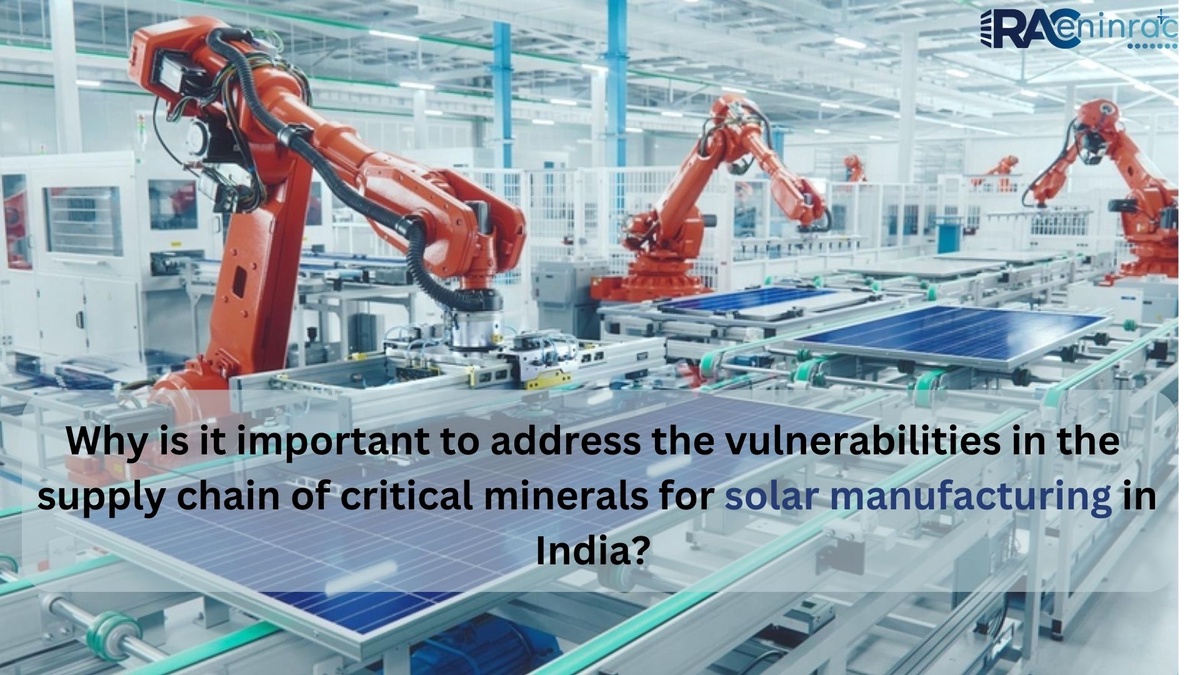Why is it pivotal for India to build robust supply chains for critical minerals for solar manufacturing?
Strategic co-operations for critical mineral supply hold high degree of importance for India
It is a well know fact that global capacity for extraction and processing of critical minerals are concentrated in a small number of markets, with China being the leading one. This clearly, creates vulnerability in the critical minerals supply chains and specially for a country like India it becomes crucial to better manage supply of minerals and their processing, refining and manufacturing metals, chemicals & intermediates etc.
This has led the way for countries to ink strategic partnerships to deal with China’s dominance and secure their supply chains in order to boost local manufacturing. For instance, the strategic Supply Chain Resilience Initiative between Australia, India and Japan can ably support the supply chain of certain critical minerals involving these countries. Apart from having critical minerals reserves crucial for battery manufacturing Australia boasts of significant reserves for minerals like titanium, niobium, rare earths, tantalum, vanadium etc. GoI has allocated formation of assessment for the critical minerals which shall consider detailed statistical exercise to ascertain that it is inclusive of several factors such as substitutability index, minerals cross-cutting index, import reliance etc. Following the EU methodology, the committee has classified critical minerals under three categories:
I. High economic importance
II. High supply risk
III. High economic importance as well as high supply risk
Mr. Ravi Shekhar, Director & Head, of Eninrac Consulting says “For India to transition to global manufacturing hub in clean energies specially for solar sector it would be key for it generate self sustainability in terms of raw materials which are critical in nature. The global transition to low-carbon energy is leading the growing demand of critical minerals across the globe. For solar sector, the focus shift of USA and EU to cut upon imports from China and generate their sustainable supply chain towards strategic collaborations in Africa, Asia and Pacific is noteworthy.
For India it will not be different either if it needs to build robust supply chain to support solar manufacturing segment and rise to the global competition. It is a well know fact that global capacity for extraction and processing of critical minerals are concentrated in a small number of markets, with China being the leading one. This clearly, creates vulnerability in the critical minerals supply chains and specially for a country like India it becomes crucial to better manage supply of minerals and their processing, refining and manufacturing metals, chemicals & intermediates etc. This has led the way for countries to ink strategic partnerships to deal with China’s dominance and secure their supply chains in order to boost local manufacturing. For instance, the strategic Supply Chain Resilience Initiative between Australia, India and Japan can ably support the supply chain of certain critical minerals involving these countries. Apart from having critical minerals reserves crucial for battery manufacturing Australia boasts of significant reserves for minerals like titanium, niobium, rare earths, tantalum, vanadium etc. which would remain vital for India’s domestic solar manufacturing prospects as the country is import dependent for tellurium, gallium, indium and copper as well.”
What will be the dynamics around critical minerals supply chain in next decade for India?
There could be bunch of scenarios which might evolve through strategic partnerships for India like the one already in place with Australia and Japan. Also, with QUAD in place more such collaboration is possible in this space to reduce dependence on China as a resilient strategic step. The scenarios are linked with China’s recent restrictions imposed upon export of few of critical minerals which might impact their domestic manufacturing. Thus, the scenarios involve following build-up cases and could be documented as below:
Use Case
• High vs. low supply chain due diligence by China
• High vs. low control of supply chain by Chain Supply Chain Scenarios for India
• Geopolitical and sustainability risk threaten the energy transition
• China’s green & clean energy monopoly continuity
• Bifurcation of critical mineral supply chains across strategic partners
• Virtuous circle of competition & sustainability
**It is involving several factors outside the scope of this scenario analysis will materially affect how things evolve, of course, including overall levels of demand for critical minerals and their prices, and technologies breakthroughs that reduce mineral requirements for key mineral requirements for energy transition applications.
Also Read : On-Demand Tracking Research Services - Eninrac


No comments yet